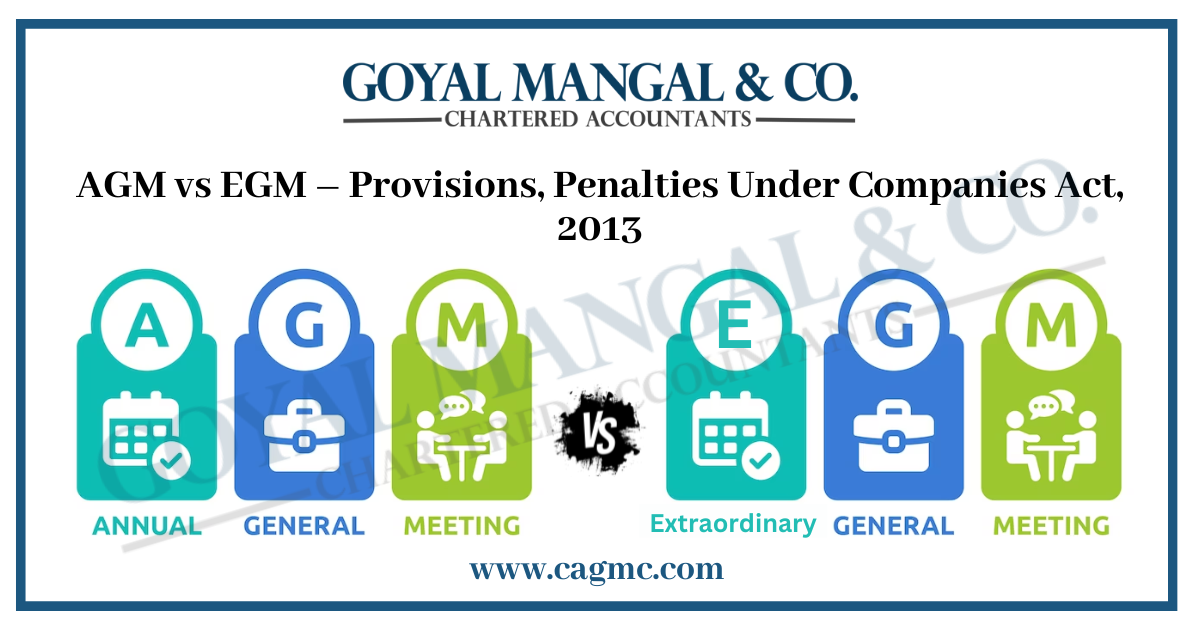
Annual General Meeting (AGM) and Extraordinary General Meeting (EGM) are different types of meetings held by Companies under the provisions of the Companies Act, 2013. The AGMs are general annual meetings compulsory by the Companies Act is significant for both kinds of meetings and failure to comply may lead to legal consequences and penalties. In this article, we are exploring about the AGM vs EGM, further discussed about the provisions, penalties, and examples under Companies Act, 2013.
|
Table of Content |
What do you mean by AGM and EGM?
AGM’s full form is Annual General Meeting, which is a compulsory to gather a company’s board of directors and shareholders annually. The AGM meeting offers an opportunity for shareholders to receive company’s performance update, make significant decisions, and discuss key matters. It is discussed under section 96(1), of the Companies Act, 2013. Here is certain AGM’s factor like:
- Legal requirement;
- Frequency;
- Shareholder participation;
- Agenda means approval of election, financial statements or re-election of directors, declaration of dividends, auditor’s appointment and any other key matters mentioned in the regulations and bylaws of the company.
Extraordinary General Meeting is abbreviated as EGM, which is a special meeting for a shareholder of the company. It is arranged outside the general schedule of annual meetings (AGMs). EGMs are arranged for a particular and urgent discussion or exceptional cases that cannot be waited till the next AGM. It is discussed under section 100 of the Companies Act, 2013. Its key aspects are:
- Its purpose is to require immediate attention like amendment in Article of Association of the company, permission of key transactions or other critical matters;
- The EGM’s agenda is to focused on particular matters for that the meeting is called.
- Full participation of shareholders.
- Rules and regulations are about to convening of EGM are generally designed in the AOA of the company.
Corporate decision making: AGM/EGM
Difference between AGM vs EGM
Here we are going to discuss about the difference between AGM and EGM Companies Act, 2013 in a tabular form:
| Particulars | Annual General Meeting under Companies Act, 2013 | Extraordinary General Meeting under Companies Act, 2013 |
| Provisions | The provision of AGM is discussed in section 96 of the Companies Act, 2013. It must be conducted within six months from the end of financial year. In which discusses about the routine matters like declaration of dividends, financial statements, and elections of director. | Section 100 of the Companies Act, 2013 provided the provision for the EGMs. |
| Purpose | AGM’s purpose is to regular annual meeting to discuss daily corporate works. | Its purpose is to conduct special meeting for exceptional and urgent cases outside the AGM schedule. |
| Penalties for Non-compliance | In case company cannot file the report after conclusion of AGM within 30 days, the company shall be liable to pay 1 lakh rupees.
Subsequent failure with additional penalty of 500 rupees for each day after 1st time of that such failure continues that leads to maximum 5 lakh rupees and each company’s officer who is in default must be liable to pay not less than 25,000 rupees. If subsequent failure, with additional penalty of 500 rupees for each day after which such failure continues, the need to pay maximum 1 lakh rupees. |
In case any company’s officer or company or any other person contradict with the company’s provision and every offer of the company who is in default shall be liable to pay 10,000 rupees. Subsequent contravention, further lead to penalty of 1000 rupees for each day after the first at which the contravention continues, the penalty shall be maximum of rupees 2 lakh, if it is a company. Furthermore, in case of any officer then penalty will be 50,000 rupees. |
| Examples | XYZ company holds its AGM each year as per compliance with section 96, in which they discussed about the routine matters includes auditors’ appointment, financial reports, etc. | Mohandas Private Ltd. calls for an EGM to seek shareholder permission for merger cases, which is identified as urgent matter. |
Takeaway
In conclusion, AGMs are regular yearly meetings compulsory by the companies Act, 2013 to discuss the daily matters. On the other side EGMs are provided as requirement for urgent and exceptional cases. In these both types of meeting, the compliance with provisions to Companies Act, 2013 and failure in compliance made the companies to pay penalties and bear all legal consequences. It ensures the participation of shareholder, transparency, and accountability. AGMs vs EGMs are collectively involved in to formal decision making and potential governance within a company.







